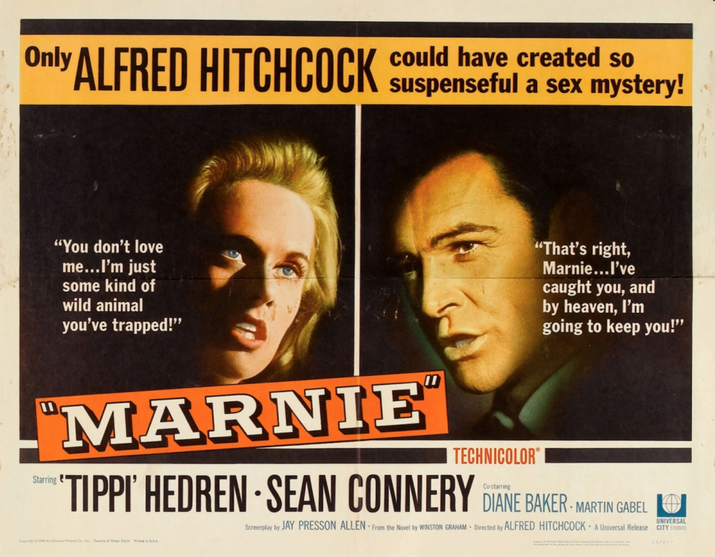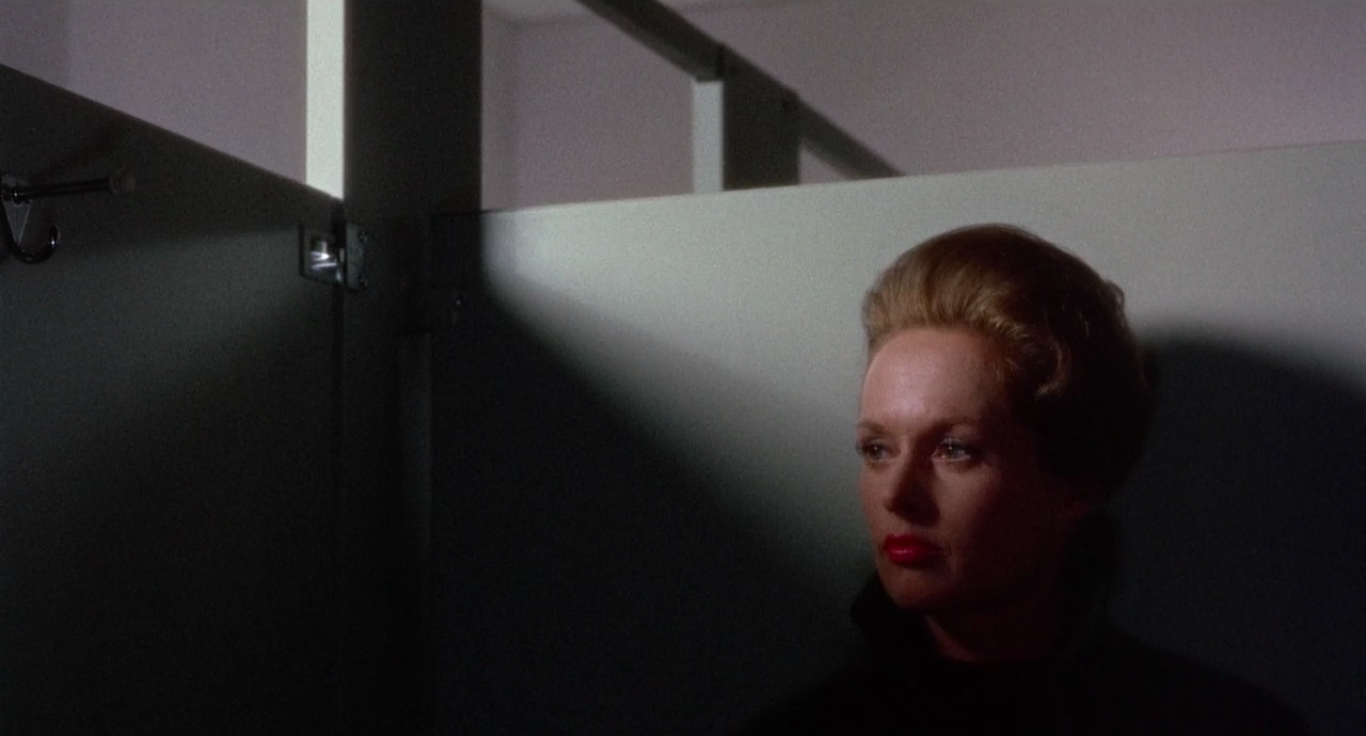|
On 16 August, 2016, Richard Brody published an article in The New Yorker entitled, "Marnie is the Cure for Hitchcock Mania." In it, he makes an extensive and persuasive argument for Marnie's status as "Hitchcock's best film," and then goes on to outline various argument about the film's style, themes, and significance in Hitchcock's oeuvre. Read the article in its entirety (click the title above). In a response of not more than 250 words, discuss one of the article's key points using references to Marnie to support your conclusions. Be careful: The point of this assignment is not to agree or disagree with Brody's evaluative assessment of Marnie as a great film, but to take up one of his points of analysis about it as a kind of troubled (even perverse) film and explore it further. You may conclude that the argument Brody makes is flawed in some way in your look at the film. But again, your task is not to evaluate the film's greatness. If you respond to this post, you need not respond to final post on Frenzy. If you respond to both, I will take the higher of the two response marks. URL: https://www.newyorker.com/culture/richard-brody/marnie-is-the-cure-for-hitchcock-mania
10 Comments
Chris Morgan Arseneau
24/11/2018 10:58:30 pm
In “Marnie is the Cure for Hitchcock Mania,” Richard Brody states that “MARNIE isn’t a horror movie, but it’s a movie of horrors, and those horrors are all connected to sex.” MARNIE is, in a sense, a cinematographic outlet or release for all of Hitchcock’s unsatisfied sexual desires and fantasies. Brody describes MARNIE as the film “in which Hitchcock, the master of control, loses control,” but Hitchcock not only loses control in directing the film–he loses control behind the scenes too. The actress who plays Marnie, Tippi Hedren, accused Hitchcock of perverse sexual misconduct and claimed he had become obsessed with her. Hitchcock’s personal obsession with the actress seems to have turned into a cinematic one on-camera. The scenes are shot in such a way that viewers can almost feel Hitchcock’s perverse desire for the actress while also feeling her character’s presence which is concurrent with her absence or desire to be absent. Hitchcock films the rape scene with such disconcerting delight that it disturbs viewers further. Even though the rape isn’t explicitly portrayed, the contrast between Mark’s sexual gratification and Marnie’s inanimate-like presence is deeply unsettling. Brody writes, “Hitchcock makes clear that his moviemaking was always calibrated to arouse a specific emotion, a specific reaction on the part of viewers.” Hitchcock’s aim in MARNIE is not to scare viewers, but rather to disturb viewers. MARNIE is so controversial because it’s Hitchcock at his most perverse.
Reply
Meghan Rulli
25/11/2018 08:46:34 am
One of the key points in the article that I’d like to focus on is how Hitchcock’s oeuvre on film is based on his furious sexual desire throughout life and in which film is the outlet for this frustration, as Richard Brody says, virtually transforming his fantasy into reality. We see this in MARNIE as it has a very difficult, sexual relationship between the main characters Marnie and Mark. Their relationship is perverse and we can establish this by which Mark is so attracted to a woman who does wrong in her life (steals, lies) and knows it’s bad. He likes to keep her in his ‘cage’ because she’s a ‘wild animal’, and this is possibly due to Hitchcock’s desires. He loses control when directing this film because he too, wants to keep the actress, Tippi Hedren, in his cage. To add on to what Chris said about the scenes being shot in a way “that viewers can almost feel Hitchcock’s perverse desire for the actress while also feeling her character’s presence which is concurrent with her absence or desire to be absent.” The scenes where she’s riding a horse can be seen as sexual connotations, specifically when she says to her horse Forio “if you want to bite somebody, bite me!” makes the viewers uncomfortable and disturbed.
Reply
Jenna Howor
25/11/2018 02:24:46 pm
Brody makes a compelling statement when he calls upon Marks oppressive, manipulative behaviors when he says “Mark, holding threat of legal complications over her head, coerces Marnie into marrying him in haste –” (para 4). This shows how perverse the film is considering how Marnie is treated by Mark. Mark did not present Marnie with much of a choice when they got married, similar to how he did not present her with any choice when he raped her. He sees her as somewhat of his possession, and it’s as though he is superior to her, which brings up the gender politics at the time. It’s a troubled film because as others have argued, Hitchcock used the characters to live vicariously in order to fulfill his “furious sexual desire” and “lack of its gratification” (para 7). This overwhelming imposition of power, over what is depicted as such a fragile woman, is what makes the audience feel so disturbed. The film is seen as perverse when the audience begins to consider the films content from Hitchcock’s point of view, and analyze what his intentions and desires were when directing the film. Another way that this film can be seen as perverse is how Mark is somewhat of a hero. Although he performs an unforgiveable and horrible action in raping Marnie, at some points in the film the audience likes Mark since he does seem to want to help Marnie to over come her traumatic past.
Reply
Larissa Szaniszlo-Luty
25/11/2018 04:03:54 pm
Similar to what Chris mentioned about the article, I found the line “’MARNIE’ isn’t a horror movie, but it’s a movie of horrors” to be the most compelling part of Brody’s argument (para. 6). However, I’m not in complete accordance when it comes to both Brody’s and Chris’ analyses. Instead of putting Hitchcock at the centre of this scrutiny, I believe that MARNIE is a film about the barbarity of male dominance and THAT is its biggest horror. Marnie, in the film, is shown to be a very fragile character because she is easily triggered and reminded of her past traumas. After trying to have sex with her, Mark becomes aware of her malady and he takes advantage of her. Any sensible person, after finding out such a detrimental thing about someone, would try to help but Rutland only makes things worse by forcing her into an unwanted marriage and, later, raping her. These two scenes clearly demonstrate that Mark and the sailor (from Marnie’s past) are the embodiments of said ‘horror’; not Hitchcock. The rape culture is so apparent throughout the film and that does nothing but enable it in real life as well (perhaps the reason why Hitchcock acted inappropriately with Tippi Hedren off camera). Marnie attempts suicide the morning after she is raped and I found that this scene was the most impactful because it’s a direct parallel to real life, where victims of sexual abuse feel like they have no other option BECAUSE male dominance and female oppression had become so normalized.
Reply
Hannah Di Francesco
25/11/2018 10:13:48 pm
In the article ““Marnie” Is the Cure for Hitchcock Mania” Richard Brody states that: “Hitchcock is utterly unguarded on the subject of technique and analysis, and utterly guarded on the subject that his movies are about.” (para. 10). This shows that the director meant for them to be interpreted different ways. He did not want there to be one specific answer or reason to why his characters did or said certain things. Hitchcock not giving an answer about the subject of his movies makes them a lot more interesting because they could apply to a multitude of things and be interpreted differently by everyone. This is why there is so much controversy around MARNIE. This movie is shocking to most people because of its perversion, but many interpret it in different ways. While some consider it a masterpiece, others consider it misogynistic and capitalist. The way it is interpreted depends on the viewers background. Also, it depends on the year it was viewed, this is why people’s opinion of Marnie changed over time. As its subjects became less taboo, the film became more appreciated. Viewers could see how the misogyny in the film, how Marnie is often controlled by Mark, like on the boat, could be interpreted as a critique of our society. This made the film a lot better in peoples eyes, but there are still people who see it as misogynistic and this divide will always be present due to everyone being unique and having their own opinions.
Reply
Kelly Rosialda
27/11/2018 05:16:25 pm
I do agree with Larissa’s point of view in which she argues that MARNIE is a film about the horrors of a man’s control over woman. Mark imposes his dominance over Marnie, over a woman. He is forceful when trying to help Marnie remember her trauma and when showing affection towards Marnie. She is seen at her most vulnerable when she is in the arms of a man, clearly uncomfortable of the situation in which she is in. For instance, Marnie directly engages with the audience during the sexual assault scene suggesting rape within a marriage. Rape within a marriage was normalized because of its symbolism in a patriarchal society. Marriage was a woman’s agreement to become a man’s object. Women were treated as pieces of property which explains Marnie’s omission and lack of resistance when Mark stripped Marnie’s bathrobe revealing her naked body. As Richard Brody cites: “What we cannot speak about, we must pass over in silence”. Marnie’s silence towards sexual assault, expresses her vulnerability and objectification to Mark making it “the loudest and most verbal silence of all time” (Brody). Marnie’s silence in scenes and omission to Mark reveals more than what is expressed in the film. Her vulnerability and her desire to resist Mark’s affection is expressed through engaging with the audience as she looks into the camera which portrays ignorance in a patriarchal society towards a woman reach for help.
Reply
Chloe Casarotto
27/11/2018 07:10:14 pm
One of the key aspects in this article is that of desires. The author of the article explains that this movie is essentially revolving around what Marc desires and what he desires is Marnie, although not as a person. Many times, Marc attempts to be intimate with his wife, for example he attempts to share a bed with her on their honeymoon, although she declines what he offers and such denial angers him. As he becomes more and more angry towards Marnie, he begins to identify her as an animal and not as human. This creates a perverseness as she is no longer a free human but she is a caged animal who cannot do anything without her husband finding out or becoming involved. Marc’s sexual desires towards her and her denial of his desires creates a conflict within their relationship as everything has an ulterior motive or is a bribery. Meaning that any action committed by either Marnie or Marc has a deeper meaning which is clear when we learn that the reason Marnie wanted a job as a bookkeeper was because she wanted to steal money from them instead of earn it. Or when Marnie attempts to leave, Marc explains that if she were to leave he would call the police and have her arrested. The perverseness in ulterior motives allows the audience to understand the toxic relationship and also the danger that desire can bring.
Reply
Cato Usher
27/11/2018 08:58:12 pm
While I agree with Larissa’s thoughts on male dominance being the main horror in a “movie of horrors”, as Richard Brody puts it, I believe there is an important distinction to be made between what MARNIE is about, and how it connects to Hitchcock himself, which is what I believe to be Brody’s main argument (para 6). The film tells the story of an obsessive man taking advantage of a vulnerable woman, symbolizing the suffocating nature of patriarchy, but it connects to Hitchcock through his own troublesome relationship with sex. As Brody explains in his article, it is the one constant throughout his career, displayed “as the engine of human society at both its best […] and its worst” (para 6). Whether or not Hitchcock was aware of just how much he vocalized his subdued desires through his films—especially MARNIE—is entirely up for debate. However, when watching the film, there remains a discomforting notion that he went overboard with the expression of his fantasy, even without knowing about his harassing Tippi Hedren during the film’s production. In a filmography full of physically and psychologically traumatic stories, MARNIE stands out as the hardest to watch without a shadow of a doubt.
Reply
Patricia Brassard
27/11/2018 10:50:51 pm
One of Brody’s most compelling statements in his article ““Marnie” Is the Cure for Hitchcock Mania’’, is when he argues Tippi Hedren “has a singular presence that mixes alertness and abstraction, a presence that’s at the same time an absence’’ (para 6). This emphasizes the movie’s “peak moment’’ (the rape on the boat), where Marnie is paralyzed with fear and proves how her absence and her silence speak loudly. Throughout the entire movie, through her presence, the audience identifies with her and through her absence the audience ‘is’ her; women, still to this day, are their own Marnie. Seeing Marnie as sometimes transparent encourages the viewer to be more than a spectator. This is why I argue that, perhaps unbeknownst to himself, Hitchcock made here a revolutionary movie, exposing the horrors of sex. Hedren’s presence as an absence is a very powerful oxymoron as it opposes the two sides she’s being pulled in. Her past and all its baggage and her present with all its current horrors that oddly mirror her past ones. It also shows how she is seen as absent by others; particularly Mark, who sees her as absent by never *really* listening to her; she has to scream to say no and yet it doesn't work, they have incessant violent arguments, he doesn’t come first to find her in her room when she yells because of nightmare and finally he doesn't let her tell her story but rather throws it in her face. Brody’s statement is, therefore, spot on.
Reply
Kristopher Woofter
1/12/2018 04:47:48 pm
MARNIE raises tough subjects that are difficult to write about, so congrats to those of you who put yourselves out there for this one! Brody raises the issue in terms of Hitchcock’s personal obsessions largely as a “way in” to these troubling topics—but not as his dominant argument, and this must be clear. Problematic in a few of these responses is a tendency to cherry-pick a minor or lesser point in Brody’s article and suggest it is a synthesis of his entire argument. Brody has much more to say than to essentialize MARNIE as Hitchcock’s masturbatory fantasy of power. Much more. Accordingly, if the response does little more than recapitulate the Brody article, or parallel it, or reduce it to something that it is not, the mark will reflect that.
Reply
Leave a Reply. |
INSTRUCTIONSPlease respond in the Comments section. To see this section, just click the red "comments" line). To create a new response, use the "Leave a Reply" box. ArchivesCategories |



 RSS Feed
RSS Feed
